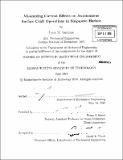| dc.contributor.advisor | Franz S. Hover. | en_US |
| dc.contributor.author | Sarcione, Lynn M. (Lynn Marie) | en_US |
| dc.contributor.other | Massachusetts Institute of Technology. Dept. of Mechanical Engineering. | en_US |
| dc.date.accessioned | 2011-03-24T20:26:35Z | |
| dc.date.available | 2011-03-24T20:26:35Z | |
| dc.date.copyright | 2010 | en_US |
| dc.date.issued | 2010 | en_US |
| dc.identifier.uri | http://hdl.handle.net/1721.1/61918 | |
| dc.description | Thesis (S.M.)--Massachusetts Institute of Technology, Dept. of Mechanical Engineering, 2010. | en_US |
| dc.description | Cataloged from PDF version of thesis. | en_US |
| dc.description | Includes bibliographical references (p. 99-102). | en_US |
| dc.description.abstract | The nation of Singapore is seeking new ways to adapt to its rapid growth. With the help of researchers and staff at the Singapore-MIT Alliance for Research and Technology (SMART), numerous data collection and analysis efforts are underway. One such effort involves the harbor where operations and oceanographic data collection missions are being completed using various sensors and autonomous systems. Utilizing Autonomous Surface Crafts (ASCs) to collect data is one such method and provides a level of robustness unachievable by humans. To improve these operations we seek to address the issue of efficiency in an environment containing surface waves, strong winds, and multiple current shears. In this thesis we present two new heading control algorithms for ASCs under the influence of currents. The first, Cross-Track Error Minimization, ensures that the vehicle follows a straight-line trajectory between two waypoints under the effects of surface waves and currents. The second controller, Time-Optimal, uses Zermelo's problem and function minimization to find the time-optimal trajectory between two waypoints using a known current field. We further define near-time-optimal paths covering a set of waypoints by defining an asymmetric Traveling Salesman Problem (TSP) where the graph nodes are the waypoints and the edges are the corresponding travel times between the waypoints. Tour construction and local search heuristics are then utilized to build near time-optimal paths. These new paths show a potential time savings of 89% leading to overall mission efficiency. | en_US |
| dc.description.statementofresponsibility | by Lynn M. Sarcione. | en_US |
| dc.format.extent | 102 p. | en_US |
| dc.language.iso | eng | en_US |
| dc.publisher | Massachusetts Institute of Technology | en_US |
| dc.rights | M.I.T. theses are protected by
copyright. They may be viewed from this source for any purpose, but
reproduction or distribution in any format is prohibited without written
permission. See provided URL for inquiries about permission. | en_US |
| dc.rights.uri | http://dspace.mit.edu/handle/1721.1/7582 | en_US |
| dc.subject | Mechanical Engineering. | en_US |
| dc.title | Minimizing current effects on autonomous surface craft operations in Singapore harbor | en_US |
| dc.type | Thesis | en_US |
| dc.description.degree | S.M. | en_US |
| dc.contributor.department | Massachusetts Institute of Technology. Department of Mechanical Engineering | |
| dc.identifier.oclc | 707103057 | en_US |
